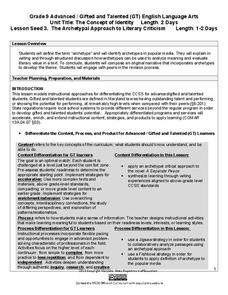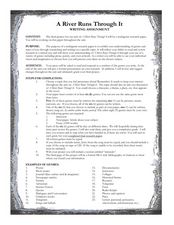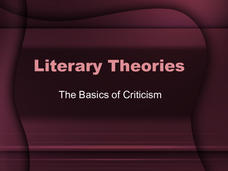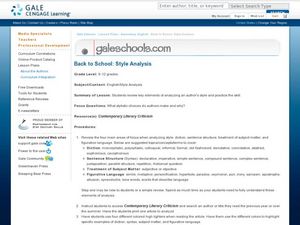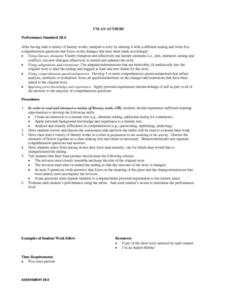Maryland Department of Education
The Concept of Identity Lesson 3: The Archetypal Approach to Literary Criticism
As class members continue their study of approaches to literary criticism, readers examine the symbolism and archetypal patterns in John Knowles' A Separate Peace, and how these parallels are used to develop a theme...
Curated OER
A River Runs Through It; Writing Assignment
While reading A River Runs Through It, have your high schoolers work on their final project, a multi-genre research paper. There are 10 clear steps for completion but not much additional help. For early high schoolers (or...
Maryland Department of Education
The Concept of Identity Lesson 2: The Historical/Biographical Approach
"How does our environment shape our identity?" After researching biographical information about John Knowles and considering how these experiences are reflected in A Separate Peace, class members consider the strengths and weaknesses of...
EngageNY
Grade 12 ELA Literary Criticism Module
Building one idea at a time. Scholars complete a close read and multiple activities related to Toni Morrison’s novel Song of Solomon to build upon their understanding of central ideas and motifs. They participate in meaningful...
Curated OER
Writing a Literary Analysis
What makes writing literary? What comprises analysis? A 15-slide PowerPoint presentation, created by the Purdue University Writing Lab, tackles these questions. The explanations of what makes writing literary and what comprises analysis...
Livaudais-Baker English Classroom
Literary Theories
Introduce ELA scholars to the basics of literary criticism with a 41-slide presentation that identifies eight different approaches to critical analysis. Each approach is defined, and advantages and disadvantages are listed. Also included...
The New York Times
I Don’t Think So: Writing Effective Counterarguments
When it comes to writing effective arguments, writers must do more than simply make a claim, counterarguments must be considered. Aspiring writers analyze counterarguments in editorials, and then learn how to write counterarguments in...
National Endowment for the Humanities
Practical Criticism
As an introduction to literary criticism, class members recreate I.A. Richards' close reading experiment. Individuals select a poem, paraphrase the story, focus on the imagery used, consider what the imagery adds to the tale, and...
Syracuse University
Ancient World Writing System
Most twenty-first century pupils don't know how to interpret cuneiform. Examining images of cuneiform and papyrus writing and using a chart and Venn diagram, young historians extrapolate what life may have been like for people who lived...
Geography 360°
Poetry Writing
Put the tips and tricks in this guide into practice in order to encourage your pupils to blossom into poets. A wonderful reference material for teachers, this packet includes definitions of poetic terms and forms as well as step-by-step...
Curated OER
Back to School: Style Analysis
Jump back into expository writing and analysis at the start of a new school year! Start with a review of an authors' stylistic choices in diction, syntax, treatment of subject matter, and figurative language. Writers choose a text to...
Maine Content Literacy Project
Introduction to Literacy Criticism
As learners continue to examine a short story of their choice, they take some time to look at analysis completed by others on the same story. In the eleventh instructional activity in a series of fourteen, pupils explore various sites...
College Board
AP® English Language: Reading and Writing Analytically
How can teachers ensure their pupils are well prepared for the AP® English exam? The reference material is a good place to start! Educators read seven essays detailing best practices for teaching scholars to read critically and write...
District 186 Springfield Public Schools
Tone, Mood, Theme, and Motif
It's all well and good when you're asked to identify a speaker's tone using his or her body language, facial expression, and pitch and emphasis. Identifying the tone of a written passage is another challenge entirely. Check out an...
Houghton Mifflin Harcourt
Person to Person: Extra Support Lessons (Theme 4)
Authors use many strategies when writing stories. A series of extra support lessons breaks down those strategies, as well as key grammatical and phonics-based concepts to support struggling learners. The last of three lessons offers...
Curated OER
Diversity in Media: Looking Critically at What We See
This learning experience fosters awareness of representations we see, and don't see, in the media. Learners list TV programs, games, and films they enjoy, identify characters' ethnic, religious, (dis)ability, and sexual orientation...
Curated OER
I Am An Author
Analyze and interpret a literary work your class has read during the course. After reading a variety of literary works, middle schoolers alter the ending of a selection by creating an alternate ending. They generate five comprehension...
Warren County Public Schools
Small Group Discussion Questions
Support a class reading of the novel Song of the Trees by Mildred D. Taylor with this series of discussion questions. Covering a variety of topics from character and setting to historical accuracy and symbolism, these questions...
Novelinks
Touching Spirit Bear: The Literary Mandala
Even someone with a dark side can make a good decision—and vice versa. Readers explore Cole's traits and decisions in Ben Mikaelson's Touching Spirit Bear and analyze his sunside and...
Curated OER
Spinelli's Maniac Magee (excerpt): Reading and Critical Thinking Practice
A brief, dialogue-rich passage from Jerry Spinelli's novel Maniac Magee is accompanied by a well-written literacy assessment tool. Thematic content lends itself to age-appropriate discussions about race relations and social justice....
Digital Writing and Research Lab's – Lesson Plans
Teaching Close Reading through Short Composition/Revision
This activity may have writers evaluate short compositions, but their subjects are quite tall: great Americans. Pupils read one another's compositions and closely examine how specific phrases and diction contribute to shaping American...
Curated OER
Investigating the Harlem Renaissance
The work of Langston Hughes opens the door to research into the origin and legacy of the Harlem Renaissance and how the literature of the period can be viewed as a commentary on race relations in America. In addition, groups are assigned...
Curated OER
The Rest Cure: Gender in Medicine and Literature
Read and discuss "The Yellow Wall-Paper" and the gender issues that the story brings up. Use articles from the time period to analyze, complete with specific discussion questions. After two days, scholars write an essay based on topics...
Curated OER
Lesson: Paul Chan: 1st Light and 5th Light
Paul Chan's latest exhibit includes seven manifestations of light. Today, kids analyze the pieces 1st Light and 5th Light. They consider the concept of opposed or dualistic realities found in literature, society, and Chan's work....


